Helping children learn English at home is not just limited to textbooks but can also become much more enjoyable when combined with games. Learning through play not only creates excitement but also helps children naturally remember vocabulary and sentence structures. So how can we effectively apply this method? Let's explore some simple yet useful tips below!
What is learning English through games?
Learning English through games is an educational method that combines language learning with fun activities, helping children absorb knowledge naturally without feeling pressure. Through games such as quizzes, word puzzles, bingo, role-playing, or educational video game applications, children can effectively practice vocabulary, grammar, pronunciation, and communication skills. This method not only makes children more enthusiastic about learning but also increases their ability to memorize and react in English in daily life.
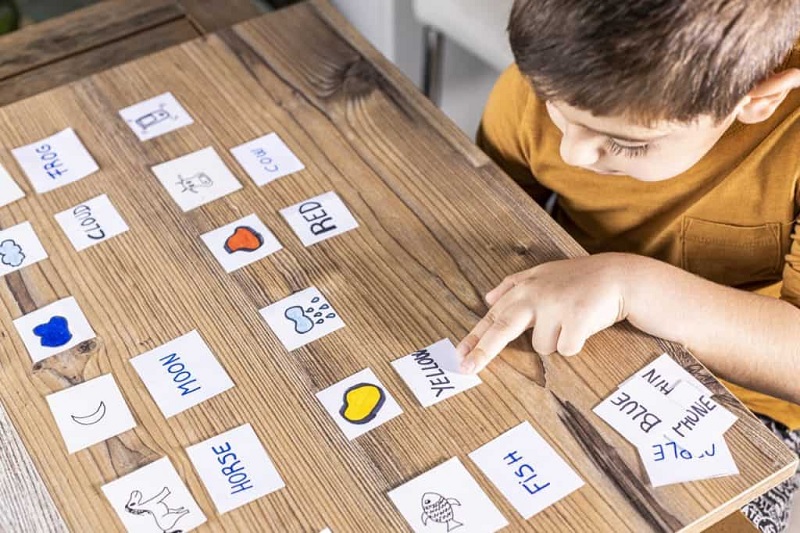
Why should children learn English through games?
Teaching children English through games brings numerous benefits, making the learning process more natural and effective. Here are some important reasons:
-
Creating excitement - Children prefer playing over traditional learning methods. Games help kids feel joyful and enthusiastic when approaching English.
-
Better retention - When participating in games, children experience and practice the language visually, which helps them remember vocabulary and sentence structure better.
-
Developing communication skills - Many games require children to speak, listen, and respond in English, improving their communication abilities naturally.
-
Reducing pressure, increasing confidence - Learning through play allows children to learn without fear of making mistakes, thus encouraging them to experiment and use English more confidently.
-
Developing thinking and creativity - English games often stimulate reasoning, memory, and creativity, helping children develop comprehensively in both language and thinking.
With these benefits, learning English through games is a wonderful method to help children acquire the language naturally and effectively right at home.
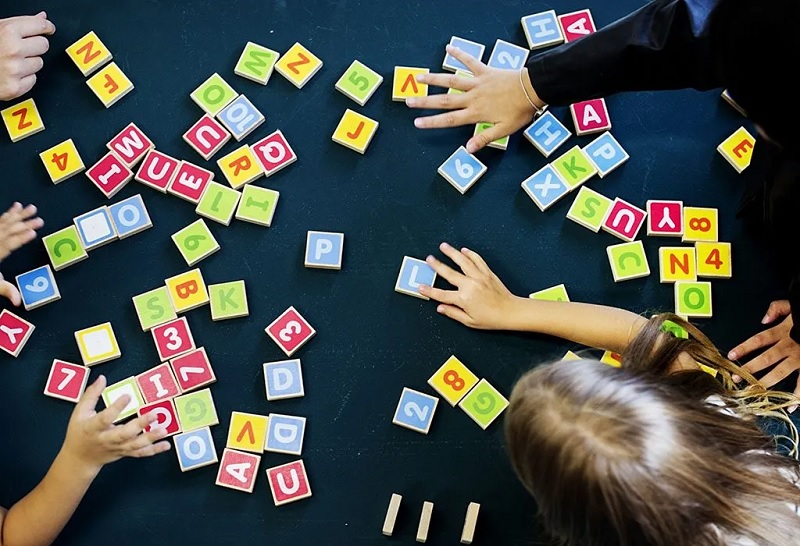
Advantages and Disadvantages of Teaching Through Play
Teaching through games is an engaging and effective educational method, but like any approach, it has both advantages and disadvantages. Specifically:
Advantages
-
Children often feel happy and excited when learning through games, which helps create motivation and positivity in the learning process.
-
Games usually require active participation from children, helping them learn actively and absorb knowledge naturally.
-
Many games encourage children to interact with their friends, cooperate, and communicate, which helps develop social skills and teamwork.
-
Games help reduce learning pressure, creating a fun and relaxing learning environment, allowing children to learn in a natural and comfortable way.
-
Learning through games, especially role-playing or construction games, stimulates children's imagination and creativity, fostering creative thinking.
-
Many games require children to think and find solutions, helping to develop problem-solving skills and logical thinking.
Disadvantages
-
Difficulty in assessing learning outcomes.
-
May lack focus on basic knowledge.
-
Requires time and resources.
-
It can be hard to maintain focus.

Effective Ways to Teach English Through Games
Learning English through games not only helps children absorb the language naturally but also creates excitement and enthusiasm in the learning process. However, for this method to be truly effective, parents need to approach it correctly. Below are some ways to help children learn English through games in the most scientific and enjoyable way.
Choose games that are suitable for the child's age and level
Each stage of a child's development is suited to different types of games. If the game is too simple, children can quickly become bored; conversely, if it is too difficult, they may become discouraged. For younger children, parents can start with games that involve recognizing images, guessing objects, or singing along to English songs. As children grow older and have a stronger foundation, more interactive games like role-playing, bingo, or word matching can help them practice English reflexes more effectively.

Create a fun and pressure-free learning environment
Children learn best when they feel happy and relaxed. Therefore, instead of forcing children to memorize vocabulary or grammar, parents should allow them to participate in games naturally. Children might make mistakes while playing, but the important thing is for parents to encourage and praise them rather than criticize. Confidence and a love for English will help children progress faster.
Combine different types of games to increase effectiveness
A repetitive game can quickly make children lose interest, so it is essential to vary the types of games. Physical games like "Simon says" or finding objects by letter not only help children learn English but also improve their physical skills. Visual games with flashcards or pictures will stimulate their memory. Additionally, parents can leverage technology with English-learning apps to add variety to the learning process.
Encourage children to use English while playing
One common mistake when applying this method is that children focus too much on the game and use little English. To avoid this, parents should guide children to communicate in English during play. Simply ask questions or give instructions in English, such as: "What color is this?", "Can you find the letter B?", "It’s your turn!". As children get used to it, they will gradually become more confident in using English naturally.
Set appropriate time limits and avoid overusing games
Although games make learning fun, overuse can make children dependent on games and detract from focusing on other skills like writing or reading. Therefore, parents should limit playtime to about 10-20 minutes per session, along with other learning methods such as reading stories, listening to music, or watching English movies. Balancing different activities will help children develop their language skills more comprehensively.
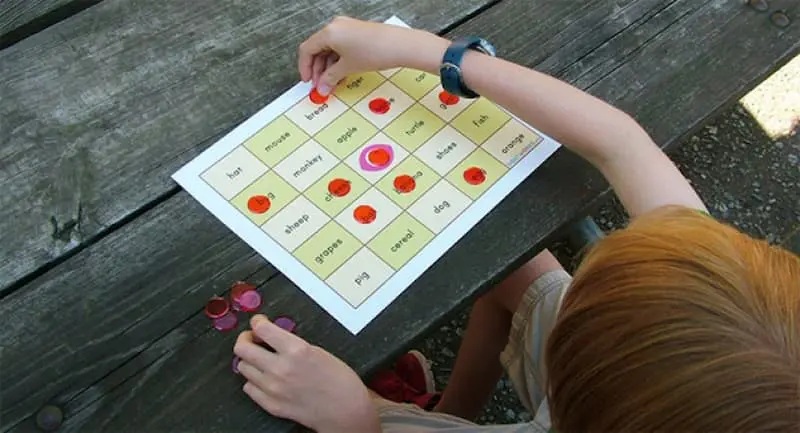
Learning English Through Games with Monkey Junior – A Great Support Tool
To make learning English through games as effective as possible, parents can use supporting apps, and Monkey Junior is one of the top choices. This is a super app for teaching English to children aged 0-11, designed with a clear learning path to help children develop all four skills: listening, speaking, reading, and writing. With over 10 million downloads worldwide, Monkey Junior has proven its quality and effectiveness in helping children learn English naturally and sustainably.

In particular, Monkey Junior is not only popular in Vietnam but has also expanded to international markets, with Thailand being one of the latest countries to feature the app. This shows that Monkey Junior is increasingly trusted by parents around the world, becoming an effective tool for teaching English to children not only in Southeast Asia but also globally.
Monkey Junior is not just an English learning app; it also integrates a variety of interactive games that help children absorb knowledge more easily. The games are divided into 10 main groups, corresponding to different levels from 1 to 5, ensuring they are suitable for the age and learning abilities of the child:
-
Phonics introduction games: Breaking eggs, Matching sounds with words containing the sound, etc.
-
Phonics review and sound matching games: Phonics cars, Sound matching, etc.
-
Vocabulary introduction games: Saving dinosaur eggs, Puzzles, etc.
-
Vocabulary review games: Catching fireflies, Filling in missing letters in words, etc.
-
Sentence introduction games: Video, Fill in the blanks, etc.
-
Sentence construction practice games: Building walls with Max, Vocabulary filter, etc.
-
Story comprehension games: Organizing story pages, etc.
-
Pronunciation practice games: Cat teaches pronunciation, Pronunciation with a robot, etc.
-
Speaking and communication practice games: Pronunciation battle, Talking with characters, etc.
-
Writing practice games: Tracing letters, etc.
Thanks to the variety and appeal of these games, children will find learning English more interesting and will absorb knowledge more easily. Monkey Junior not only helps children learn vocabulary but also supports pronunciation, listening, reading comprehension, and communication, creating a strong foundation for children to develop their language skills comprehensively.
Sign up today to get the chance to receive a discount of up to 50% and help your child develop English skills in the most effective way possible!
Conclusion
Learning English through games is a great way to help children learn. By choosing the right games, creating a fun learning environment, encouraging kids to speak English, and balancing their study time, parents can help their children improve their language skills naturally. With Monkey Junior, children can learn English in a structured way, making it easier to pick up the language and use it confidently in daily life.



.jpg)
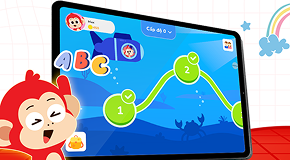
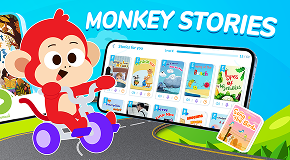
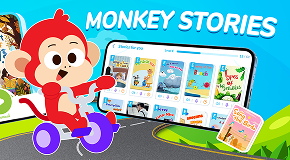
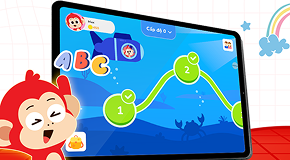
.svg)
.png)



.jpg)
